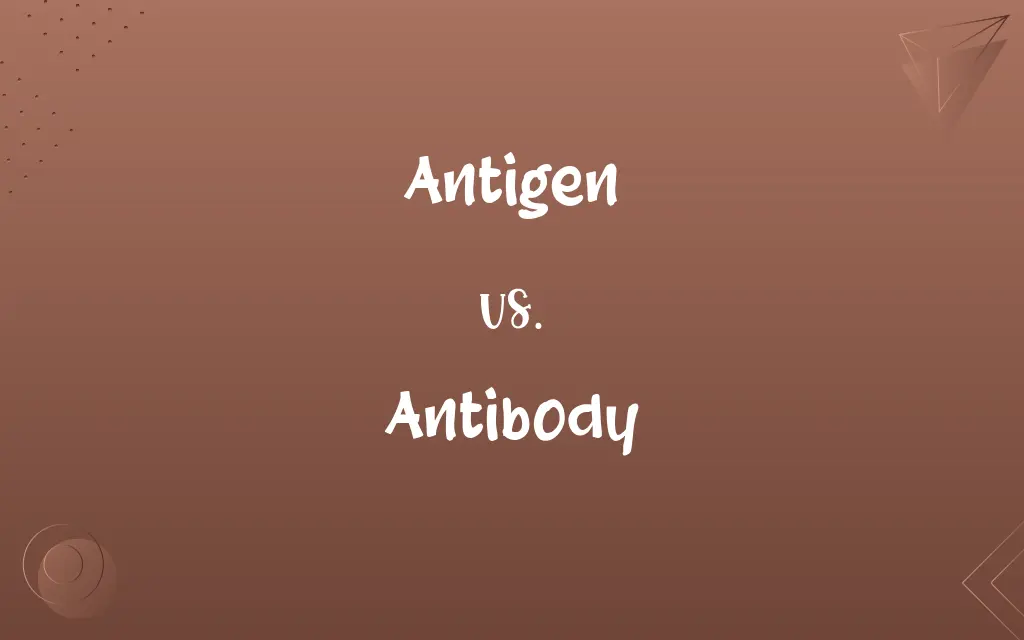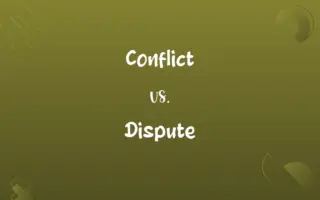Antigen vs. Antibody: Know the Difference

By Shumaila Saeed || Updated on December 25, 2023
Antigens are foreign substances that trigger an immune response, while antibodies are proteins produced by the immune system to neutralize antigens.

Key Differences
An Antigen is any substance that the immune system identifies as foreign, triggering an immune response. This can include viruses, bacteria, and foreign cells. An Antibody, on the other hand, is a specific protein produced by the immune system in response to an antigen, designed to neutralize or destroy it.
Shumaila Saeed
Dec 18, 2023
The primary role of an Antigen is to initiate the immune response. They are recognized by their unique molecular structures. Antibodies, in contrast, are produced by B cells of the immune system and specifically target antigens for neutralization or destruction.
Shumaila Saeed
Dec 18, 2023
Antigens can be a part of a pathogen or a foreign substance, and their presence in the body is what prompts the immune response. Antibodies bind to these antigens, effectively marking them for attack by other immune cells or directly neutralizing them.
Shumaila Saeed
Dec 18, 2023
The interaction between an Antigen and an Antibody is highly specific; each antibody binds to a specific antigen, much like a key fits into a lock. This specificity is crucial for the effectiveness of the immune response.
Shumaila Saeed
Dec 18, 2023
While Antigens are the cause of an immune response, Antibodies are part of the body's defense mechanism. The presence of antigens in the body indicates a potential threat, whereas antibodies represent the body's attempt to neutralize or eliminate that threat.
Shumaila Saeed
Dec 18, 2023
ADVERTISEMENT
Comparison Chart
Definition
A foreign substance that triggers an immune response
A protein produced by the immune system to fight antigens
Shumaila Saeed
Dec 18, 2023
Origin
Can be from pathogens or foreign substances
Produced by the body’s immune cells, mainly B cells
Shumaila Saeed
Dec 18, 2023
Function
Initiates immune response
Neutralizes or marks antigens for destruction
Shumaila Saeed
Dec 18, 2023
Specificity
Recognized by its unique structure
Highly specific to the antigen it targets
Shumaila Saeed
Dec 18, 2023
Role in Immune Response
Causes the immune response
Part of the body’s defense mechanism
Shumaila Saeed
Dec 18, 2023
ADVERTISEMENT
Antigen and Antibody Definitions
Antigen
An antigen is a substance that induces the production of antibodies due to its foreign nature.
The flu virus acted as an antigen, triggering an immune response in her body.
Shumaila Saeed
Dec 11, 2023
Antibody
An antibody is an immune protein that recognizes and binds to foreign substances.
The vaccine stimulated his body to produce antibodies against the flu virus.
Shumaila Saeed
Dec 11, 2023
Antigen
Antigens are molecular structures on pathogens that are recognized by the immune system.
The unique antigens on the bacteria made it easy for the immune system to identify them.
Shumaila Saeed
Dec 11, 2023
Antibody
Antibodies are part of the adaptive immune response, tailored to specific antigens.
The presence of antibodies to measles in her blood indicated immunity from past exposure.
Shumaila Saeed
Dec 11, 2023
Antigen
Antigens are the target against which the immune system directs its response.
The antigen on the surface of the virus was quickly recognized by her immune cells.
Shumaila Saeed
Dec 11, 2023
ADVERTISEMENT
Antibody
An antibody is a protein produced by the immune system to identify and neutralize antigens.
The antibodies in his blood effectively neutralized the invading bacteria.
Shumaila Saeed
Dec 11, 2023
Antigen
Antigens include proteins, polysaccharides, or toxins that trigger antibody production.
The tetanus toxin, a potent antigen, causes the body to produce specific antibodies.
Shumaila Saeed
Dec 11, 2023
Antibody
Antibodies help in the immune response by neutralizing pathogens or preparing them for ingestion by phagocytes.
His antibodies attached to the toxins, preventing them from harming his cells.
Shumaila Saeed
Dec 11, 2023
Antigen
An antigen is any foreign substance that can elicit an immune response.
Pollen grains serve as antigens, causing allergic reactions in sensitive individuals.
Shumaila Saeed
Dec 11, 2023
Antibody
Antibodies bind specifically to antigens to mark them for destruction by immune cells.
Her antibodies latched onto the virus, marking it for elimination by white blood cells.
Shumaila Saeed
Dec 11, 2023
Antigen
A molecule that is capable of binding to an antibody or to an antigen receptor on a T cell, especially one that induces an immune response. An antigen is usually a foreign substance, such as a toxin or a component of a virus, bacterium, or parasite.
Shumaila Saeed
Dec 08, 2023
Antibody
Any of numerous Y-shaped glycoproteins that bind to specific antigens and either neutralize them or cause them to be destroyed by other elements of the immune system, such as phagocytes, cytotoxic cells, or complement proteins. Antibodies occur as antigen receptors on the surface of B cells and are secreted as soluble proteins when the B cells mature into plasma cells. Antibodies are also called "immunoglobulins."
Shumaila Saeed
Dec 08, 2023
Antigen
(immunology) A substance that induces an immune response, usually foreign.
Shumaila Saeed
Dec 08, 2023
Antibody
(immunology) A protein produced by B-lymphocytes that binds to a specific antigen.
Shumaila Saeed
Dec 08, 2023
Antigen
Any substance (as a toxin or enzyme) that stimulates the production of antibodies
Shumaila Saeed
Dec 08, 2023
Antibody
Any of various bodies or substances in the blood which act in antagonism to harmful foreign bodies, as toxins or the bacteria producing the toxins. Normal blood serum apparently contains various antibodies, and the introduction of toxins or of foreign cells also stimulates production of their specific antibodies by the immune system.
Shumaila Saeed
Dec 08, 2023
Antibody
More narrowly, any of the immunoglobulins present in the blood serum or other body fluids of an animal, which reacts with a specific antigenic substance, whether the antibody was produced as a consequence of the stimulus provided by the antigen, or was pre-existing prior to exposure of the organism to the antigen.
Shumaila Saeed
Dec 08, 2023
Antibody
Any of a large variety of proteins normally present in the body or produced in response to an antigen which it neutralizes, thus producing an immune response
Shumaila Saeed
Dec 08, 2023
Repeatedly Asked Queries
Can someone be allergic to antigens?
Yes, some people have allergic reactions to certain antigens, like pollen or pet dander.
Shumaila Saeed
Dec 18, 2023
Can antigens be found in healthy cells?
Typically, antigens are associated with foreign substances, but some healthy cells can express antigens under certain conditions.
Shumaila Saeed
Dec 18, 2023
Are all antigens harmful?
Not all antigens are harmful; some, like those in vaccines, are beneficial in stimulating an immune response.
Shumaila Saeed
Dec 18, 2023
How do antigens work in vaccines?
In vaccines, antigens stimulate the immune system to produce antibodies without causing disease.
Shumaila Saeed
Dec 18, 2023
Can antibodies fight off infections?
Yes, antibodies play a crucial role in fighting infections by neutralizing pathogens or marking them for destruction.
Shumaila Saeed
Dec 18, 2023
Are antibodies specific to each antigen?
Yes, antibodies are highly specific and typically bind to only one type of antigen.
Shumaila Saeed
Dec 18, 2023
Are antibodies present in all body fluids?
Antibodies are present in many body fluids, including blood, saliva, and breast milk.
Shumaila Saeed
Dec 18, 2023
What is an antigen?
An antigen is any substance that the immune system identifies as foreign, triggering an immune response.
Shumaila Saeed
Dec 18, 2023
Can antigens mutate?
Yes, antigens, particularly on viruses, can mutate, which may affect how the immune system recognizes them.
Shumaila Saeed
Dec 18, 2023
Do antibodies have different classes?
Yes, there are different classes of antibodies, such as IgM, IgG, and IgA, each with a specific role in the immune response.
Shumaila Saeed
Dec 18, 2023
What is an antibody?
An antibody is a protein produced by the immune system that binds to and neutralizes antigens.
Shumaila Saeed
Dec 18, 2023
Do newborns have antibodies?
Newborns receive some antibodies from the mother but also start producing their own shortly after birth.
Shumaila Saeed
Dec 18, 2023
How long do antibodies last in the body?
The lifespan of antibodies varies; some may last for years, providing long-term immunity.
Shumaila Saeed
Dec 18, 2023
Can someone have a deficiency in antibodies?
Yes, some individuals have conditions where they produce insufficient antibodies, impacting their immune response.
Shumaila Saeed
Dec 18, 2023
Are antigens the same as allergens?
Allergens are a type of antigen that specifically trigger allergic reactions.
Shumaila Saeed
Dec 18, 2023
Can antibodies be used therapeutically?
Yes, antibodies can be used in therapies, such as monoclonal antibody treatments for various diseases.
Shumaila Saeed
Dec 18, 2023
Can exposure to an antigen lead to immunity?
Yes, exposure to an antigen can lead to the development of immunity through the production of specific antibodies.
Shumaila Saeed
Dec 18, 2023
How are antigens used in blood typing?
Blood types are determined by specific antigens present on the surface of red blood cells.
Shumaila Saeed
Dec 18, 2023
Do antigens always trigger a strong immune response?
Not always; the strength of the immune response to an antigen can vary based on several factors.
Shumaila Saeed
Dec 18, 2023
Are antibodies always beneficial?
While antibodies are crucial for immunity, in some cases, like autoimmune diseases, they can be harmful.
Shumaila Saeed
Dec 18, 2023
Share this page
Link for your blog / website
HTML
Link to share via messenger
About Author
Written by
Shumaila SaeedShumaila Saeed, an expert content creator with 6 years of experience, specializes in distilling complex topics into easily digestible comparisons, shining a light on the nuances that both inform and educate readers with clarity and accuracy.









































































